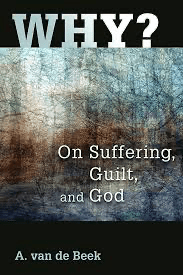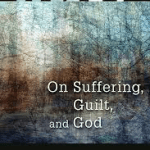“Why? On Suffering, Guilt and God” Part 1
Today I begin my commentary and critique of A van de Beek’s book “Why?” Some of you are reading it along with me. Others can listen in and ask questions, but please do not make any judgments about the book or what others who are reading it say about it if you are not reading it with us. I will continue to announce here when we who are reading it are to move forward. I will space out these occasional commentaries and critiques. Please don’t comment about a portion until after we have read it.
I am going to refer to the author as “Beek” even though I know A. van de Beek is his whole name (with the “A” standing for Abram and he goes by “Bram” to his friends). Beek begins by apologizing for another book about God and the problem of evil and says “Now the church has always seen suffering in relation to God. The question is what role does God play in the experiences of suffering?” He then goes on in 1. Apology to explain his theological method: “We are bound by the sources of the Christian tradition, of which Jesus Christ is the center.” However, he acknowledges that there is no escaping tradition and experience in our thinking about God and suffering. He also affirms the use of reason as “consistency” in theological thinking. This sounds something like the so-called “Wesleyan Quadrilateral.”
However, and this is a big “however,” on page 5 Beek admits that “we have no alternative but to acknowledge…that…discontinuities in our thinking will remain.” That is the essence of his “apology”—that he does not expect to solve the problem of evil within a Christian theistic worldview with any finality. He concludes this chapter: “In short, this book intends to make a contribution in the common struggle to fathom our human situation with God; in other words, a contribution in the common struggle to know God as the God of this world—our world.” (5)
Beek then moves on to THE problem in chapters 2 and 3. “Both divine omnipotence and divine goodness are fundamental to Christian theology.” (5) But how to reconcile them in light of our human experience of evil and innocent suffering? In these chapters it becomes clear that Beek will not turn to process theology or Hegelian thought or any non-traditional view of God that he considers a denial of God’s omnipotence. He will hold firmly to God’s omnipotence as he believes it is crucial to the biblical witness and to our Christian knowledge and experience of God. So the question is: “Why did not God do things differently? Why is there so much suffering and injustice, if God could have acted differently?” (13)
In chapter 3 Beek turns to the other side of the enigma: God’s goodness. As with God’s omnipotence he has no intention of qualifying God’s goodness. Beek rejects an Augustinian view that all things are good because God is their source, the creator of all that is. He rejects that view because “Not everything in the Bible is called ‘good.’ People turn out not to be what God has intended.” (17) THAT is where I stopped and caught my breath. THAT is what I have always believed. But so many theologians are not willing to say it that boldly and blatantly. So where is Beek going if not into some limitation of God’s omnipotence or God’s goodness? He insists (in this chapter) that “good” cannot just mean “whatever God decides and does.” “The goodness of God is no empty concept.” (17) Beek closes the chapter with a BIG clue to a central theme of the book: “Ever since Jesus Christ has come into the world, the goodness of God can never again be viewed apart from him…. In Christ, God in goodness and with his entire being has turned to the cries and tears of the wretched.” (18)
There it is—the central thesis of “Why?” But it will need to be fleshed out. What does he mean that God “has turned?”
In chapter 4 Beek talks a bout “suffering and sin” Here the author simply elaborates the problem: “Why did God permit—or perhaps even will—that human beings should be sinful? How could he create beings who were able to commit the horrors humans have perpetrated?” (20) This is a question Christian theologians have wrestled with much, very much, for two thousand years. Does Beek have a better answer than most?
In chapter 5 Beek finally tells us what he going to DO in this book—in contrast to other books about the problem of evil. He is going to talk about omnipotence and THEN about goodness. He says we cannot choose between them, but neither can we talk about them at the same time. He announces that he is going to start with omnipotence and then turn to goodness. “One has to start with one of the two approaches. If I choose to begin with omnipotence, it is because this access road is usually taken in the history of dogma.” (22) He is going to talk about traditional and existing “models” of omnipotence and then of goodness. In the very last paragraph (p. 23) Beek tells us something very important, almost giving away what is going to be different about this treatment of the problem of evil. He will talk about God’s “history” with us. Here is the thesis of the book: “Only within that history do alternate models gain their meaning and place, and one will not exclude another.” (23)
By the end of this part, page 23, Beek had my attention and interest. At least from the years of my seminary studies I have always been obsessed with the problem of reconciling God’s omnipotence with God’s goodness and I refused to go down the voluntarist rabbit hole of saying that whatever God does is good just because God does it. But I also refused to sacrifice any of God’s omnipotence. So, by page 23 Beek had me hooked. I agree with his theological method and share his concern for consistency in thought and his desire to reconcile God’s omnipotence and goodness in light of the problems of evil and innocent suffering. I investigated process theology, Hegelian thought, existentialist theology (paradox), and even some theologians who dared to question God’s goodness. I found all of those to be dead ends—at least for me.
Might Beek have a better answer? We’ll see…stay tuned!
*If you decide to comment on this post, please make sure you have read the material discussed (viz., “Why? Part 1). If you have not read the material, you may ask a question but don’t expect an answer; you may or may not receive one. In every case, keep your comment relatively brief, on topic, addressed to me, civil and respectful (not hostile or argumentative) and devoid of pictures or links.*













